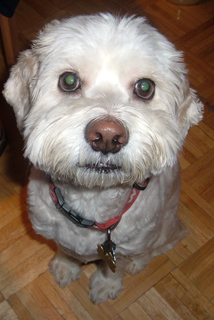Is my dog Jewish?
Permanent link

I’ve lived around my fair share of dog lovers.
One needs only to trace some of the cities and neighborhoods I’ve lived in: Growing up in Highland Park, I saw owners dress their pets in hats, sweaters, dresses and bedazzled collars and serve their dogs in Evian-filled water dishes; in London, where I studied abroad, I found an entire Burberry-for-dogs clothing line in Harrods department store and lived across from a park filled to the brim with Sunday-afternoon dog-walkers; in Roscoe Village, where I now reside, I’ve seen dogs pushed in strollers along streets filled with dozens of pet boutiques and groomers sandwiched between maternity shops—Roscoe Village is, after all, the land of babies and dogs.
Don’t even get me started on the new trend of “barkeries”—or dog treat boutiques—that are popping up.
Yes, I’ve seen it all.
Now, here’s the part where I put my tail between my legs.
I love my family dog—so much so, that I may or may not have helped my mother pick out a sweater for him at one time to help him ruff (pun stops here) the tundra-like temperatures in our family backyard during wintertime.
Also, I may or may not spend a great deal of time analyzing his simple psyche every time I visit my parents’ house.
My mother and I have concluded that Archie, a cocker spaniel-poodle mutt born on a farm in Iowa, is Jewish.
Despite his blondish-white shaggy hair, we think this Cockapoo has got some Jew. (In an aside, I have to point out the ironic fact that we named Archie after the character Archie Bunker from “All in the Family”—one of the most blatantly anti-Semitic, racist characters in television history. However, my family loved the show.)
Like his namesake, Archie (the dog) is a simple creature. But, one thing is certain: he loves food in general, and challah and matzah in particular. On this reason alone—if nothing else—my mother and I have concluded he’s Jewish.
Archie’s reactions during Shabbat prayers provide an interesting case study in Pavlov’s theory about conditioning. He barks when my dad begins the prayer over the challah. Archie also has some separation anxiety from his mother (my mother), among other neurotic traits stereotypically associated with Jewish men. Not to mention, he commands attention with his vocal attempts to be the loudest one in the room.
Archie’s incessant barking, fueled by his desire for matzah, got my mother and I discussing his psyche yet again during our Passover Seder a few weeks ago.
After our meal, I pulled a book from my parents’ bookshelf called “Yiddish for Dogs” by Janet Perr, which my sister bought for them years back, particularly because the drawn figure on its cover is the spitting image of Archie.
The book, a self-described alphabetical handbook of Yiddish words, features illustrations of dogs meant to embody the Yiddish words’ meanings. The book, a sort of Yiddish encyclopedia, features words such as “putz”—featuring a black lab with a dunce cap; “shvitz,” showing a pug sweating and panting; and words such as “drek,” with an image of Archie’s twin stuck in a trash can.
The level to which we project human qualities on our pets got me wondering just how far people’s attempts might extend into the spiritual realm. But my short-lived quest to see if the Jewish Paris Hiltons of the world love their pets to the degree that they might convert them was somewhat fruitless.
I contacted Congregation B’nai Torah in Highland Park, because I had worked with one of the rabbis there in the past on stories. While he was not available to comment, his assistant did reveal the synagogue had gone so far as to host a pet blessing day event in the past. However, she said she did not know of any conversions.
The event, which was geared toward children, included blessings for a variety of animals such as fish, dogs and hamsters and wished the pets health; they expressed thankfulness for the pets’ companionship, she said.
My Catholic friend Melissa Riske, whom I wrote about in my last Oy! article, informed me there is a similar ritual in the church around the first week of October, in which Catholics recognize or celebrate St. Francis of Assisi—a blessing is near his feast day.
I also contacted JUF to see if they knew of a rabbi that performed pet rituals with no luck there.
Finally, I spoke with my family’s rabbi at Anshe Emet Synagogue in Chicago, Rabbi Michael Siegel, who not only humored me, but also spoke eloquently on the matter.
Siegel said that while Jewish law covers issues regarding the proper treatment of animals—for instance, he said there has been a tremendous amount written about feeding an animal before feeding oneself—there is no conversion process for animals or pets.
However, he pointed out that with the increasingly important role pets play in people’s lives, events such as “bark mitzvahs” now exist, which he said speaks to the notion that to a growing number of people, pets have taken on a familial significance likened to children.
Siegel said people are feeling “less communal” and more “individually minded,” these days, and thus want to put original touches on a 1,000-year-old prayer book. Blessings are constantly being updated, he said.
With Holocaust Remembrance Day last weekend and Israel Memorial Day ahead of us, I’m reminded of how we, Jews, both evolve our understanding of present day culture, while remembering ancient tales.
We both recycle and re-invent what it means to be Jewish, reflected both in the tales of our destruction and in our re-building.
So, though I didn’t find a rabbi who would officially convert Archie, or any other dog, I learned that perhaps it is not such a small gesture to take time to recognize our pets through Jewish ritual, because we are reinforcing and celebrating our Jewish identity in doing so. Plus, I’m pretty convinced Archie is already Jewish anyway.



.jpg)



